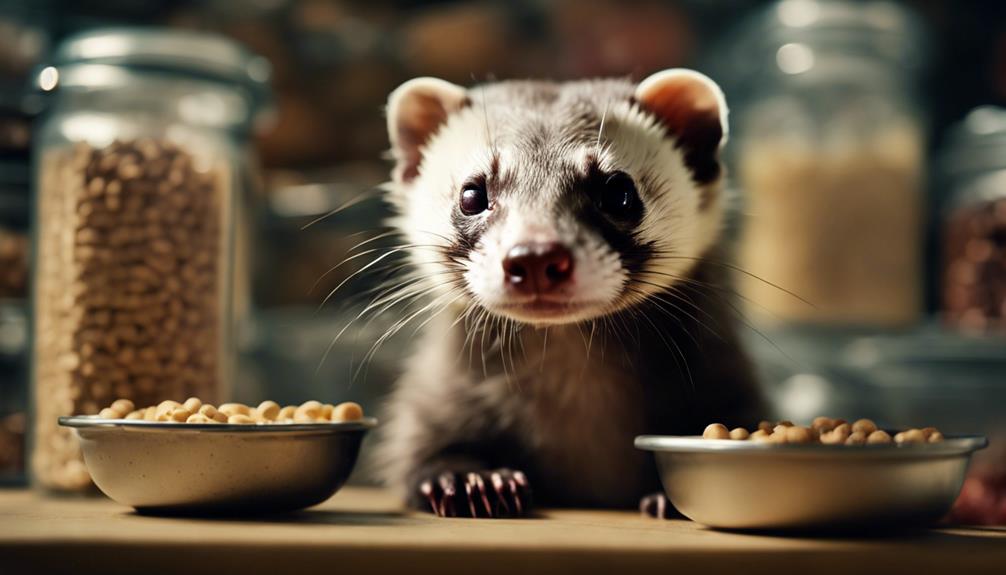When Is It Time to Adjust Your Ferret's Diet?

If you notice your ferret gaining or losing weight rapidly, it might be time to adjust their diet. Ferrets should maintain a healthy weight to avoid potential health issues. Additionally, changes in your ferret's energy levels or coat condition could indicate a need for a diet adjustment. Keep an eye on their appetite and monitor any changes in their eating habits. If your ferret shows signs of digestive issues or abnormal stool, consult with a veterinarian to determine if a dietary change is necessary.
Remember, a ferret's diet plays a crucial role in their overall health and well-being. It's essential to provide a balanced diet that meets their nutritional needs. Regularly evaluate your ferret's diet and make adjustments as needed to ensure they stay healthy and happy.
Signs of Weight Changes
Recognizing signs of weight changes in your ferret is crucial for maintaining its overall health and well-being. Ferrets, like humans, can be prone to weight fluctuations, which can impact their quality of life. Monitoring your ferret's weight regularly, alongside its exercise routine, is essential for effective weight management.
Changes in weight can indicate underlying health issues or improper diet and exercise habits. If your ferret is gaining weight, it may be consuming too many calories or not getting enough exercise. On the other hand, sudden weight loss could be a sign of illness or malnutrition.
To maintain your ferret's optimal weight, it's important to establish a balanced diet and regular exercise routine. Providing high-quality ferret food and engaging your pet in play and physical activity can help prevent weight-related problems. Additionally, consulting with a veterinarian for guidance on proper nutrition and exercise can ensure your ferret stays healthy and happy.
Health Issues and Dietary Needs

Ferrets require a diet that promotes digestive system health, with a focus on high-quality protein sources to meet their specific nutritional needs.
Understanding the protein requirements for ferrets is crucial to maintain their overall health and well-being.
Digestive System Health
Maintaining a balanced diet is crucial for ensuring optimal digestive system health in ferrets. Ferrets possess a delicate digestive system that relies on a healthy balance of gut flora and digestive enzymes to function properly.
Gut flora, the beneficial bacteria living in the gastrointestinal tract, plays a vital role in digestion and overall health. A diet rich in essential nutrients helps support the growth of beneficial gut flora, aiding in digestion and nutrient absorption.
Additionally, ensuring an adequate supply of digestive enzymes through high-quality protein sources is essential for breaking down food effectively. By prioritizing a balanced diet that supports gut flora and provides necessary digestive enzymes, ferret owners can help maintain their furry friends' digestive system health.
Protein Requirements for Ferrets
To ensure optimal health and meet their dietary needs, ferrets require adequate protein in their diet. Protein sources for ferrets include high-quality meat-based products such as chicken, turkey, and lamb. These meats should make up the majority of a ferret's diet to ensure they receive the necessary amino acids for growth and maintenance.
It's essential to avoid plant-based proteins as ferrets are obligate carnivores and can't efficiently digest plant matter. Ferret owners should aim for a protein intake of around 32-38% in their pet's diet, with fat making up approximately 15-20% of their daily intake.
Ensuring the right balance of protein and fat is crucial to support their high energy levels and overall health.
Nutrient Deficiencies Prevention
Preventing nutrient deficiencies in ferrets is crucial for maintaining their overall health and meeting their specific dietary needs. Nutrient absorption plays a vital role in ensuring ferrets receive the necessary vitamins and minerals. To prevent deficiencies, it's essential to provide a diet that offers a proper balance of nutrients.
Ferrets require a diet rich in high-quality animal protein, fats, and limited carbohydrates to support their unique metabolic needs. Ensuring dietary balance is key to preventing deficiencies that could lead to various health issues. By offering a diet that promotes optimal nutrient absorption and meets their specific nutritional requirements, ferret owners can help their pets thrive and maintain good health.
Always consult with a veterinarian to tailor a diet plan that suits your ferret's individual needs.
Aging and Nutritional Requirements

As ferrets age, their nutritional requirements may shift, necessitating adjustments to their diet to support their changing needs. Here are some key points to consider when addressing aging and nutritional requirements in ferrets:
- Decreased Metabolic Rate: With age, ferrets may experience a decrease in their metabolic rate, requiring fewer calories to maintain a healthy weight.
- Joint Health: Older ferrets may benefit from diets rich in omega-3 fatty acids and glucosamine to support joint health and mobility.
- Digestive Health: As ferrets age, their digestive system may become more sensitive. Easily digestible proteins and fibers can help promote digestive health.
- Increased Nutrient Absorption Needs: Aging ferrets may require diets with higher nutrient absorption rates to ensure they're getting the necessary vitamins and minerals.
Nutritional counseling from a veterinarian experienced in ferret care can provide valuable insights into tailoring a diet that meets the specific needs of aging ferrets. By understanding the aging process and its impact on nutritional requirements, ferret owners can make informed decisions to support their furry companions' health and well-being.
Behavioral Changes and Diet

During the aging process, ferrets may exhibit behavioral changes that can impact their dietary needs and preferences. Behavioral changes such as decreased activity levels or increased restlessness can be indicative of underlying health issues, which can influence weight management and nutritional requirements. It's crucial for ferret owners to monitor these behavioral changes closely and consider adjusting their diet accordingly.
Weight fluctuations due to changes in behavior can signal the need for diet adjustments. If a ferret becomes less active and gains weight, it may be necessary to reduce the calorie intake by switching to a lower-calorie food or adjusting portion sizes. On the other hand, if a ferret displays increased activity levels and loses weight, offering a higher calorie or more nutrient-dense diet might be beneficial. Observing their behavior around mealtimes can also provide insights into their preferences, allowing for a tailored approach to their diet.
Understanding the relationship between behavioral changes and diet is essential for maintaining the overall health and well-being of aging ferrets. By staying attentive to their behaviors and making appropriate dietary adjustments, owners can help support their furry companions as they age.
Transitioning to a New Diet

When transitioning a ferret to a new diet, it's important to introduce the changes gradually to prevent digestive upset. This process requires careful planning to ensure your pet's health and well-being. Here are some diet transition tips and ferret food options to consider:
- Gradual Transition: Start by mixing a small amount of the new food with the old food and gradually increase the ratio over a week or two.
- Food Introduction: Introduce one new food item at a time to monitor your ferret's reaction and prevent overwhelming their digestive system.
- Meal Planning: Develop a meal plan that includes a balanced mix of protein, fats, and nutrients suitable for ferrets' dietary needs.
- Ferret Food Options: Explore different commercial ferret food brands or consider preparing homemade diets under veterinary guidance to provide a variety of nutrition sources.
Consultation With a Vet

Consulting with a veterinarian is crucial to ensure your ferret's dietary needs are met appropriately and to address any health concerns effectively. When seeking advice from a vet, they can provide nutritional counseling tailored to your ferret's specific requirements. Vets can recommend dietary modifications based on your ferret's age, activity level, and any existing health conditions. They can also guide you on how to introduce new foods safely and monitor your ferret's response to dietary changes.
Nutritional counseling from a vet is essential to prevent deficiencies or excesses that could harm your ferret's health. Consulting with a professional ensures that you're making informed decisions regarding your ferret's diet. Vets can also help you navigate any challenges or concerns you may have about adjusting your ferret's food, making the process smoother and more effective. Remember that a vet's expertise is invaluable when it comes to your ferret's well-being, so don't hesitate to seek their guidance.
Monitoring and Adjusting Diet

Ferrets' dietary needs can change over time, especially if they develop health issues. Regular monitoring of their diet is crucial to ensure they're receiving the proper nutrition.
It's advisable to consult with a vet to make any necessary adjustments to your ferret's diet for their optimal health and well-being.
Dietary Needs Change
For optimal health, regularly monitor and adjust your ferret's diet to meet their changing dietary needs. As ferrets age or experience health changes, their dietary requirements may evolve. Here are some key points to consider:
- Meal Frequency: Assess if your ferret's current feeding schedule aligns with their activity level and age.
- Dietary Supplements: Evaluate if additional supplements are needed to address specific health concerns or deficiencies.
- Caloric Intake: Adjust the amount of food offered based on your ferret's energy levels and weight management needs.
- Protein Content: Ensure that the protein levels in their diet are appropriate for their age and health status.
Health Issues Require
Monitoring and adjusting the diet of a ferret with health issues is crucial for maintaining their well-being and addressing specific nutritional needs. Dietary adjustments play a significant role in managing health concerns that may arise in ferrets.
For instance, if a ferret has gastrointestinal problems, the diet may need to be modified to include easily digestible foods. In cases of obesity, reducing the fat content and caloric intake can help address this issue. On the other hand, if a ferret is experiencing hair loss or skin problems, incorporating foods rich in essential fatty acids may be beneficial.
Consult With Vet
To ensure optimal dietary adjustments for a ferret with health concerns, consulting with a veterinarian is essential for tailored guidance and monitoring. Dietary consultations and nutritional assessments play a crucial role in determining the best diet for your furry friend. Here are four key reasons why involving a vet is beneficial:
- Professional Advice: Vets offer expert opinions based on the ferret's specific health needs.
- Customized Diet Plans: They can create personalized diet plans to address any nutritional deficiencies.
- Monitoring Progress: Vets can track your ferret's response to dietary changes and make adjustments as needed.
- Preventative Care: Regular consultations help in identifying potential health issues early on, preventing future complications.
Frequently Asked Questions
Can I Feed My Ferret the Same Diet Throughout Its Entire Life?
Ferrets require dietary adjustments as they age to prevent health concerns and promote longevity. Consistent monitoring of their nutritional requirements is essential throughout their lives. Providing a balanced diet tailored to their changing needs ensures optimal health.
How Often Should I Adjust My Ferret's Diet?
For ferrets, adjusting their diet periodically is crucial for optimal health. To meet their nutritional requirements, consider incorporating supplements, managing protein intake, and adjusting feeding frequency based on weight. Regular vet consultations can help guide these adjustments.
Are There Any Specific Dietary Changes I Should Make for Pregnant or Nursing Ferrets?
During pregnancy or nursing, ferrets require specific dietary adjustments. Introducing nutritional supplements like taurine is crucial. Increase feeding frequency to about 4-6 small meals per day. Ensure a balanced diet to support the mother and her offspring's health.
Can I Mix Different Types of Food Together for My Ferret's Diet?
When mixing different types of food for a ferret's diet, it's important to ensure nutritional balance and variety to support their digestive health. Consider their preferences and gradually introduce new foods to avoid upsetting their stomach.
Is It Safe to Give My Ferret Human Food as a Treat?
Giving human food to ferrets as a treat poses health risks due to their specific nutritional needs. Maintaining a balanced diet tailored to ferrets is crucial for their well-being. Human food may lack essential nutrients and upset their digestive system.










